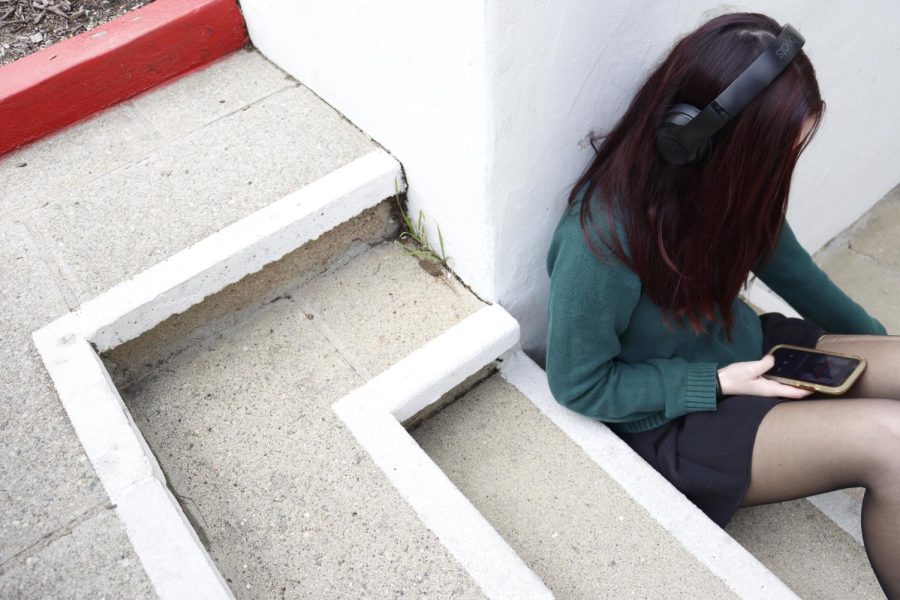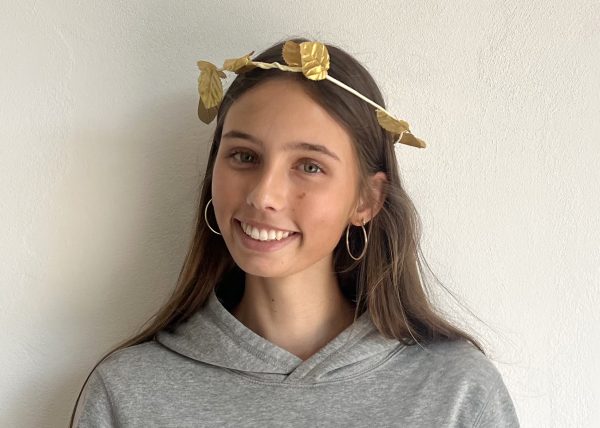Music as medicine: Transformational power of music for teens’ mental health
Photo credit: Zoe Gazzuolo
Sophomore Alicia Flores listens to music during one of her free periods. Flores said music has always played a big role in her life. “I’m not sure what I would do every day if I didn’t have music,” Flores said, “or what would fill in the gaps.”
April 15, 2023
A sad song that makes you cry every time you listen to it. A dreamy melody that drifts you off into sleep. A rap song that gets you pumped up for the gym. For many, music isn’t just a form of entertainment — it’s medicine.
Music has scientifically-proven benefits for both mental and physical health, and music can be used in clinical settings and everyday life to substantially change individuals’ wellbeing.
Mental Health in Teens
Mental health issues among teens have increased at a steady rate for the past few decades and were accelerated with the COVID-19 pandemic. The Centers for Disease Control and Prevention reported 42% of United States high school students “experienced persistent feelings of sadness or hopelessness” in 2021, compared to the 28% reported in 2011.
“I’ve definitely seen a huge rise in mental health issues with teenagers — depression, anxiety and self esteem issues. We’re living in a different world than 25 years ago,” high school guidance counselor and mental health therapist Judy Laufer said. “There’s a lot more pressure on kids now, so there’s a lot more need for mental health support.”
According to the World Health Organization, globally, 1 in 7 adolescents aged 10-19 are experiencing mental health issues. Common mental health conditions for this age group are anxiety disorders, behavioral disorders and depression.
Music as Medicine
The idea that music is medicine has been appreciated across millennia, with the first recorded case of music therapy in 1789. Recent neuro-scientific discoveries on music’s physical and emotional effects have helped explain the power of music and led to a 142% increase in North American music therapy businesses between 2017 and 2021.
Dr. Andrew Knight is an associate professor of music therapy at Colorado State University. His research has been published in journals such as the Music Therapy Perspectives, and he is also a co-editor of the Introduction to Music Therapy textbook, published by the American Music Therapy Association.
Knight has explored many aspects of music therapy, including the use of music in the music therapy profession and the effects it has on the brain.

“Up until the last 20 years, we were like, ‘Humans like music, and it plays all these different roles in society, and it’s great,’” Knight said. “But recently, we were able to see that music is activating this front part of our brain that makes us feel things when we hear certain lyrics. It’s activating this back part that affects our motor coordination and makes you want to dance to a beat; it’s powerful because it activates these deep emotional centers of our brain.”
Knight said music can improve everyday quality of life by allowing people to bond, inspiring people to exercise more, help to identify or express what emotions one is feeling and much more.
“Music is something that everyone on the planet loves in some way, despite specific preferences or how many differences we may have,” Knight said. “So that’s an opportunity for all of us to determine how to use it as a resource.”
According to Laufer, music can be an especially impactful tool for teenagers in order to identify, express or validate their feelings and emotions.
“When we’re at that age as a middle schooler or high schooler, we’re still learning how to express ourselves and how to verbalize our feelings. Some kids have a hard time verbalizing what they’re feeling or even understanding what they’re feeling,” Laufer said. “… Music can really come into play, and serve as an outlet that lets them feel whatever emotions they may be dealing with and express themselves through the music.”
Listen to the audio clip below to learn more about high school guidance counselor and mental health therapist Judy Laufer’s thoughts on music as a form of expression.
Kalani Das is a professional percussionist, certified music educator and the Director of Golden State Music Therapy. On his website, Das described music therapy with the purpose of improving the client’s overall quality of life and helping them develop non-musical skills important to daily living, socialization, overall functioning and more.
“Music therapy can help uncover subconscious or unconscious thoughts, beliefs or feelings that a person struggling is aware or unaware of. That can happen because music is not analytical; it’s not about language. In other words, people don’t have to talk about things,” Das said. “They can non-verbally express different kinds of thoughts and emotions through musical interactions to help get to the heart or root of an issue, and develop coping mechanisms.”
Music in Everyday Life
Music’s benefits extend beyond only academic or clinical settings. Its accessibility has increased with streaming services such as Spotify and Apple music, which now allow around 96% of Americans to use music in their everyday lives.
“Today, it’s really easy for people to feel lonely, and they have no one or they can’t reach out to anyone,” sophomore Alicia Flores said. “If they don’t feel comfortable [reaching out], then music is a really powerful source to utilize.”
According to Johns Hopkins Medicine, listening to music is scientifically proven to lower anxiety and blood pressure, alleviate pain, improve sleep quality and more.
“Music plays a varying role in people’s lives, but for those of us who do have a connection with music, it can be affirming to one’s beliefs. It can be comforting because even instrumental music can evoke certain feelings or thoughts,” Das said. “Often people will say that a song helped them feel seen or recognize that somebody else has been in a similar situation and understands them.”
Flores said music allows her to intensify any emotion she may be feeling, and finding a song for whatever situation or mood she’s experiencing has been beneficial for her.
“[Music] helps you deal with certain situations because you can see yourself in the song, and yourself in the lyrics,” Flores said. “It makes you feel like there’s other people going through the same thing as you.”
Though music is widely accepted as a beneficial tool in bettering overall health, one University of Arizona study found that different genres of music carry different impacts. For instance, classical music amplifies dopamine release, aiding in learning and memory. In contrast, pop and rock music improve physical performance and endurance.
“If somebody’s goal is to exercise more, music can inspire them to exercise more. They can put on the right tracks that they want to go and run to or that they want to get pumped up and lift weights at the gym to,” Knight said. “If they’re feeling depressed, they can listen to music that helps them identify what emotions are going on and express the sadness that’s happening for them.”
Concerts are another form of music in everyday life that help people by bringing them together. According to US News and World Report, concerts bring about a sense of community that can better mental outlook and longevity.
“It’s really important for people to recognize how big of a role music plays in our lives, which you realize if you go back to the pandemic when most people weren’t going to concerts,” Knight said. “When everyone started going to concerts again last year, we were like, ‘wow, this is amazing. I forgot how good it feels when I’m hearing a song performed live with a whole bunch of other people singing along.’”
Moving Forward
There is no perfect song or artist that has the power to make all of life’s challenges easy. But many experts, such as Das, have said music is a powerful and therapeutic outlet that allows people to express themselves, transform moods, enhance overall wellbeing and much more.
“We hear certain music that we connect with and some that we don’t connect with, so encouraging kids to just take time to listen to music that they connect with every single day is a really, really good escape and … parallel to meditation,” Laufer said. “Disconnecting from the pressure of everyday life by closing your eyes and listening to your favorite band can be a very necessary break from the stress.”










